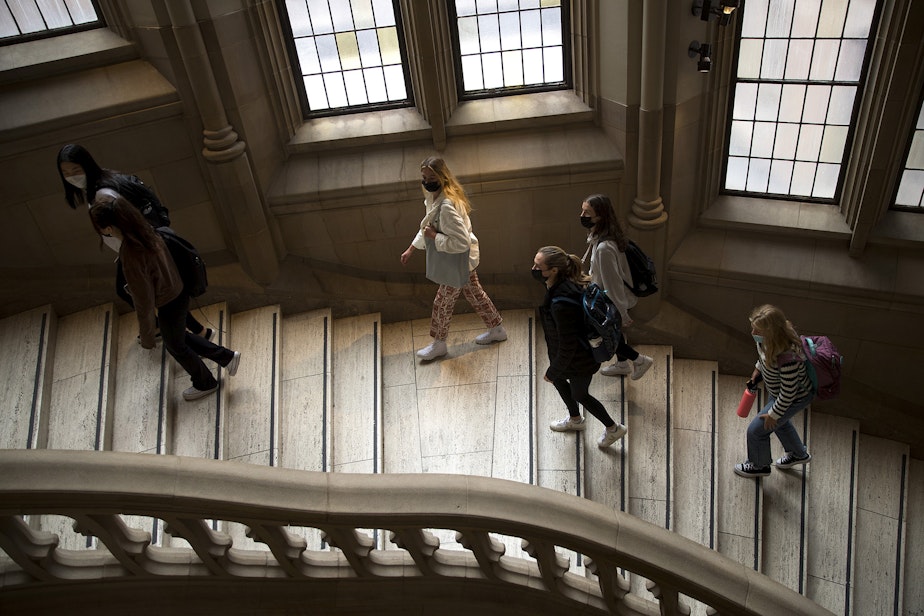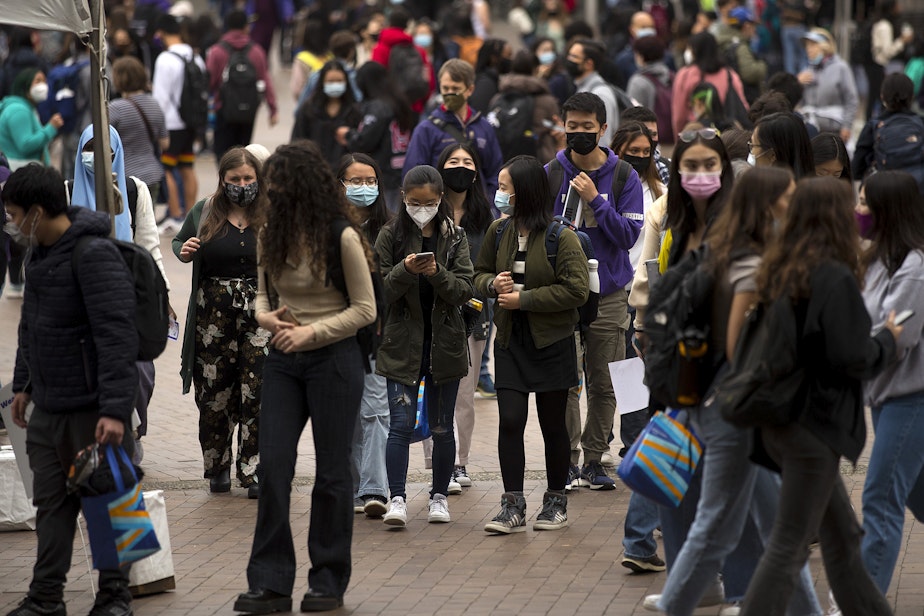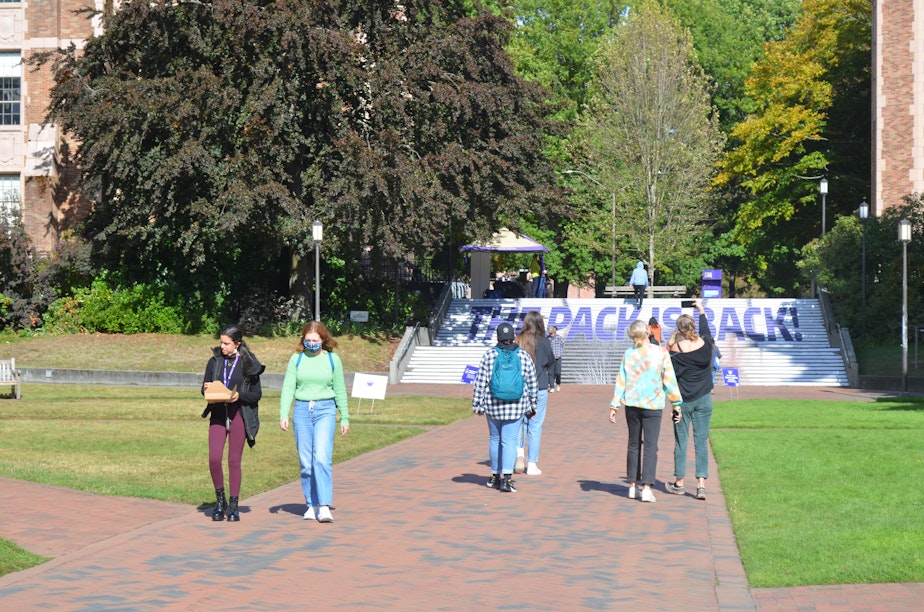"The pack is back," and UW students are thrilled. Professors, maybe less so

After a year and a half of online classes, UW students are thrilled to be back in person.
But not everyone on campus is as excited. Some faculty members say the school isn’t doing enough to prevent the spread of Covid as students and professors return to classrooms and dining halls.
On Tuesday, bells rang to welcome students back to campus. And the stairs around the quad and Red Square were painted purple with “Welcome Home, Huskies” and “The Pack is Back” in bold white letters.
As for the students, they were stoked to be here.
“I would not have been happy if we had to be online for our first year of college,” one first-year student said. “So I’m excited that we’re going to be in person for sure.”
“I’m so glad that we’re able to come back in person this year,” a sophomore said. “I definitely looked forward to moving out [of my parents’ house] and leaving and coming to college and meeting people.”
“I’m just kind of happy that I get to spend my last year on campus,” a senior said.

The students said the last year and a half of online learning were not great.
“The biggest thing for me was like labs,” bioengineering sophomore Kirsten said, “because it’s YouTube videos, and then the TAs would explain. You know, they would have a PowerPoint, and they'd be like, ‘This is what you would see when you did this step, and this is what would happen when you did this step.’”
Kirsten’s classes this fall will be her first in-person college courses. She said she feels pretty safe being here.
“The fact that the university's requiring everyone to be vaccinated, and like having masks in the classes, I think that's really like, all you can do,” she said. “You can't go on online forever. Like, I don't think that's a good way to have your education or college education, especially.”
But not every professor feels as safe as the students do.
Sponsored
Melissa Knox is a teaching professor in the economics department. Her children are eight and 11 — too young to be vaccinated.
“A lot of what's motivating me is this fear that, you know, I will get Covid and pass it on to my children,” Knox said. “Or that someone in my class will get Covid from being in one of my classes and pass it on to, you know, someone else in the community who's at risk.”
Knox says teaching online was brutal: Since she couldn’t see her students, it was a lot harder to gauge their level of understanding. And doing her own job, while also overseeing her kids’ education, meant a year and a half of basically not sleeping.
But, she said, she thinks the university isn’t doing enough to prevent the spread of Covid on campus. She’d like there to be more remote options for both professors and students, and more assurance that the university has checked the airflow in all the classrooms and will be providing air filters as needed.
On top of that, she said, “they are not planning to do any kind of social distancing. So they're saying, as long as you're masked, you can essentially sit in a 40-person room with 40 students.”
Knox also wishes she could know when there’s a student in one of her classes with a medical or religious exemption to the vaccine.
Some professors have written emails and letters and signed petitions asking for more safety measures like these.
One contentious issue has been when and how students’ vaccination status will be verified.
Knox worries that it could be awhile before all her students’ vaccine cards are checked.
“They're saying that they will be verifying people's vaccine status,” she said, “but we don't really have much of a guarantee that that proof will have been actually verified until the winter quarter.”

“So it's kind of still a little bit up in the air who will be vaccinated,” she said.
Other professors want to just trust the students’ attestations.
“I found it depressing: the assumption that students always lie and they're going to lie and they're going to, you know, lie about this as well,” said Sarah Stroup, a professor in the Classics department. “How can you teach that way? I don't understand that.”
Stroup is almost as excited as the students to be back on campus.
“This is what college is supposed to be,” she said. “This is our mission is to take care of them — pedagogically but also sort of socially and emotionally.”
Sponsored
Stroup said she’s comfortable with the university’s Covid policies. The students she’s talked to were all excited to be vaccinated.
And, she said, “We have great tracing. We have very strict rules on what happens if a student should ever show up without a mask.”
She said, for situations like that, she’ll bring a ziplock bag of surgical masks to every class.
“If a student doesn't have a mask, you give them a mask,” she said. “If they don't put it on, you tell them to leave. If they don't leave, you dismiss class.”
Back on the quad, sophomore Kirsten said living with her parents for one last year wasn’t all bad. It gave her a chance to kind of ease into college.
“The way it worked out, I got to figure out how to do classes and how to do all the academic stuff my freshman year,” she said. “And, now, my sophomore year, I get to do more of the social things and meeting people.”
Walking around campus, that's what I saw: students with buttons and candy trying to sign people up for clubs and activities, students getting coffee and chatting in pairs and clusters.
Even outside, almost everyone was masked — but together.




